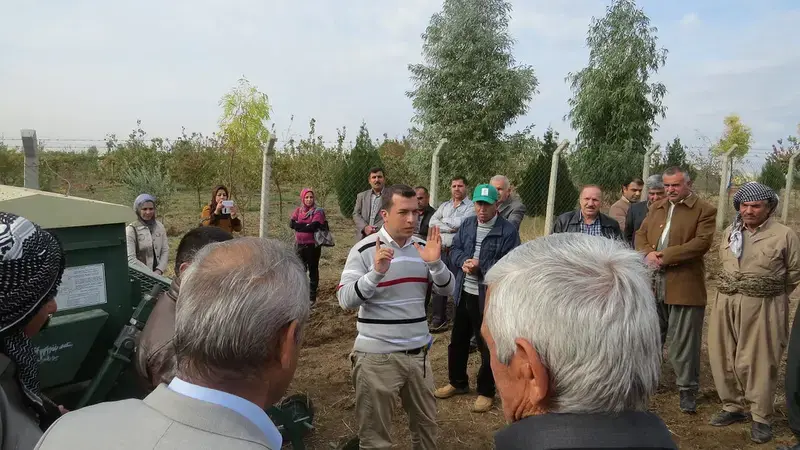Supporting rural people as they transition from conflict and instability

In countries emerging from conflict there is often an urgent need to rebuild and rehabilitate devastated agricultural sectors. Conflict and instability can damage critical infrastructure, weaken national seed production and distribution, and cause widespread natural resource degradation. Limited institutional support can also reduce investments in extension services and agricultural research for development.
The collapse of agricultural production systems brings additional hardship for rural people – declining economic growth, widespread poverty, hunger and malnutrition – and conflict-induced displacement can result in a loss of critical knowledge and skills.
Strategic rehabilitation efforts
ICARDA has worked in post-conflict situations for over 40 years, gaining unique experiences and useful skillsets that can help countries quickly rebuild their agricultural sectors. The Center offers support across several crucial areas such as re-establishing national crop heritage; developing improved crop varieties; initiating fast-track seed supplies; developing national food crop gene banks; and supporting new value chains that generate new income streams for local communities.
We also prioritize capacity development, working with rural communities and national agricultural researchers to build the skills they need to address critical challenges – not only those specific to post-conflict situations, but also challenges posed by new and emerging climate scenarios.
Rebuilding Afghanistan’s agricultural sector
Agriculture dominates Afghanistan’s economy – contributing some 40 percent of gross domestic product and providing livelihoods and employment for the vast majority of the population [1] . Given this critical importance, the sector’s performance has significant implications for the country’s overall recovery.
Decades of conflict had already taken a heavy toll on Afghanistan’s agricultural sector when the 2001 invasion occurred. The invasion brought new challenges and exacerbated existing ones: financial resources were depleted – preventing farmers from investing in their farms; communities were displaced and farms left untended; extension services ceased; common resources were destroyed; and a generation of displaced children grew up with no direct knowledge of farming – a critical loss of skills and knowledge [2] . To make matters worse, the invasion was followed by several years of prolonged drought.
Not long after the invasion, the ICARDA-initiated Future Harvest Consortium brought together national and international partners to address immediate hunger and food security, and put the country’s agricultural sector on a more sustainable long-term path to recovery. The initiative combined improved crop varieties, stronger seed systems, capacity-strengthening, improved soil and water management, livestock productivity, and efforts to rebuild research stations with seed health and testing labs.
A subsequent partnership with Afghanistan’s Ministry of Agriculture, Irrigation and Livestock also included efforts to pilot-test and develop agricultural value chains: greenhouse production of off-season and high-yielding vegetable crops, local production of herb oils by women’s cooperatives for high-value domestic and export markets, and the production for meat and dairy products – for both household food security and income generation.
Rebuilding Iraq’s agriculture sector
The contribution of Iraq’s agricultural sector to the national economy may be smaller – at five per cent of GDP – but an estimated one-third of the country’s population live in rural areas and depend on agriculture for their livelihoods [3] . Over the past 15 years the contribution of agriculture to national GDP has continued to decline – due to a combination of weak institutional frameworks, weak extension services, rural poverty, unrest and critical damage to irrigation and drainage infrastructure[4] .
ICARDA supported Iraq’s National Development Plan (2010-2014), which aimed to develop a stable, competitive, and sustainable agricultural sector to enhance food security, protect the natural environment, and generate jobs and rural incomes. Support included efforts to address Iraq’s salinization problem which effects an estimated 75 percent of the country’s total irrigated area, approximately two million hectares (ha). The multi-partner ‘Iraq Salinity’ initiative proposed solutions and an investment plan to rejuvenate production on salt-affected lands.
The Center also managed a USAID-funded initiative to strengthen agricultural value chains. Targeting key crop commodities crucial to Iraq’s food security, Harmonized Support for Agricultural Development – or HSAD - helped to improve the competitive potential of the country’s agricultural sector through stronger extension services, capacity development, and the reform of agricultural policies, regulations, and institutions. Last year, ICARDA also wrote a national strategic review to help Iraqi policy makers address rising food insecurity and malnutrition.
Another major focus has been the promotion of Conservation Agriculture – the practice of not plowing farmlands and leaving crop residue in the field for improved soil fertility and water conservation. In response to the prohibitively expensive nature of imported zero till seeders, ICARDA stimulated the creation of local markets for their manufacture and repair. The move contributed to the spread of CA across Iraq – from 0 ha in 2007 to over 15,000 ha in recent years.
Rebuilding for the future
Today’s conflicts in Syria, Yemen, and elsewhere, continue to take a heavy toll on agricultural production systems. However, learning the lessons of past efforts now can inform the preparation of effective reconstruction strategies when fighting eventually ends. With sufficient backing from donors ICARDA and its partners can rebuild each country’s agricultural fabric and eventually generate new opportunities to revitalize rural communities and strengthen their post-conflict transition.
[1]http://documents.worldbank.org/curated/en/105291468189865782/pdf/E40140v20EA0P10120Box371917B0SAR0ER.pdf
[2]https://www.odi.org/sites/odi.org.uk/files/odi-assets/publications-opinion-files/4939.pdf
